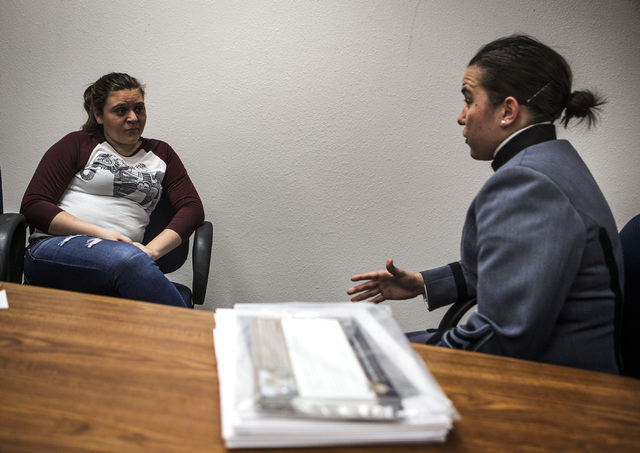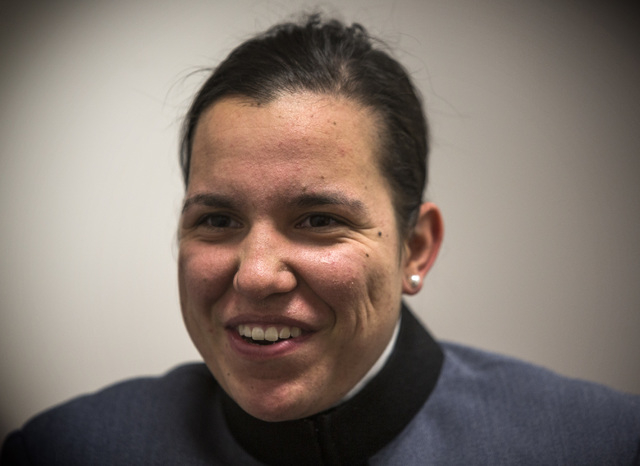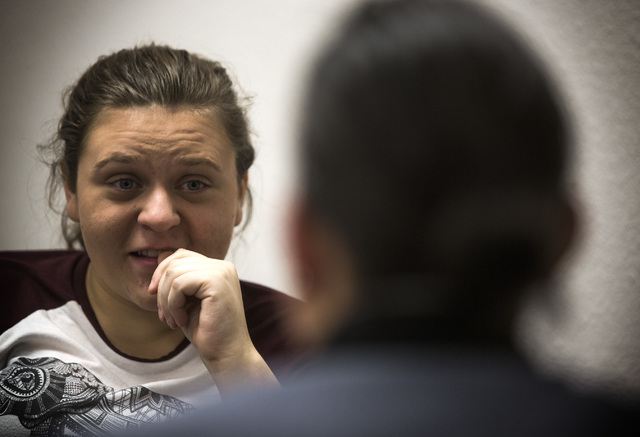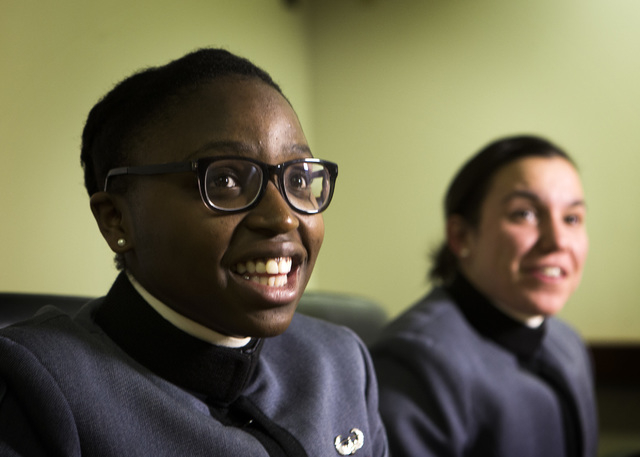2 LV West Point cadets give thanks, spread the word





Ask a couple of West Point cadets at home in Las Vegas what they’re grateful for on Thanksgiving Day and their answer might be they’re thankful that they’re not doing pushups in snowbound New York state or cramming for finals at the U.S. Military Academy.
Or in the case of senior cadet Capt. Krystal Onyema and sophomore cadet Cpl. Taler Brazell, as two young women they ought to be thankful for equal footing in the academy’s mostly male population of soon-to-be Army officers.
While those thoughts are on the back of their minds, they said their vision for giving thanks today is focused on being with their families and getting a chance to spread the word to high school students about opportunities at the prestigious West Point academy.
At the top of their list is gratitude for U.S. troops on duty around the world today who are fighting to preserve America’s freedoms.
“I’m thankful for all the soldiers fighting for us right now. I know we’re going to be joining them soon,” said Brazell, 20, who graduated from the Meadows School last year.
“For everything they’ve done and all those who fought for our country and are currently fighting … and those who can’t have the opportunity to go home to be with their families, I’m thankful that they’re willing to sacrifice that for us,” she said.
She said she’s especially thankful for her family.
“I can’t put into words how thankful I am to have them in my life and repay them for everything they’ve done for me,” Brazell said. “I’m (also) thankful for my friends. They’ve been there behind me and supported me through thick and thin, through good times and bad.”
Onyema, 21, said she, too, is thankful for her friends and family, as well as her “new family” at West Point.
“I’m thankful for just the different freedoms afforded me and the different role models that we have,” she said.
Since enduring the physical and mental rigors of West Point after graduating from Faith Lutheran High School in 2011, Onyema said this is the first time she’s come home to Las Vegas for Thanksgiving. This year, because she’s involved with West Point’s outreach program, she gets a whole week of leave time instead of the standard Wednesday through Sunday for most cadets.
Among her four stops this week was Cheyenne High School “to communicate what West Point is all about.”
She tells students “I’m giving you my perspective of what I’ve gone through, what I’ve seen. Essentially I tell them all the great things that West Point has to offer but also be honest in that it’s not all roses, and it’s not all peachy.”
Much of the academy is about discipline, training and education that results in a military career with applications in civilian life. It’s seldom easy to be part of “the long gray line” of graduates who became military leaders after President Thomas Jefferson established the academy in 1802.
“I actually do feel not a lot of pressure, but enough where I want to push and be the best that I can be … to not let them down, to contribute more to that line as well,” she said.
Brazell pitched her perspective on West Point to students at the Meadows School, Bishop Gorman and Silverado high schools.
“The bottom line is West Point has a ton of opportunities, so many opportunities that people don’t realize,” she said. “It breaks down the stereotypes of being in the military, especially the women.
“It’s not a typical college experience. You can’t compare it to other colleges,” Brazell said. “You have so much more than academia. But at the same time you become a leader, and you’re leading people. I think those are traits that you can’t get at any other university.”
In the first six weeks of cadet basic training “you transform a lot.”
“It seems like I was there a lot longer than six weeks but I grew so much as an individual. I grew in maturity,” she said. “You’re basically taken as a high school student and transformed into a soldier. You are stripped of your phone for six weeks, and you can only write to your family through letters.
“You have to learn how to bond with the squad and be a part of it. You no longer are just an individual,” Brazell said. “I think basic training breaks you down to your core and allows you to be built up. When I finished basic training I was definitely a different person.”
For example, while her high school classmates were fretting their first midterm college exams, she was learning how to survive as a soldier in combat and keep herself and her squad members alive.
“You get the whole gamut of the military. You learn how to shoot a weapon, shoot a rifle, how to take accountability of a rifle,” she said. “Your rifle is with you 24/7. You sleep with your rifle. It goes to dinner with you. You don’t let that thing out of your sight; otherwise you’re doing pushups.
“You learn how to throw grenades. You go to a gas chamber. … They yell, ‘Gas! Gas! Gas!,’ and you’ve got to put on your mask really quick,” she said. “There are times in the rain when you were sitting there wondering, ‘Why did I choose this?’ But at the end of the day, I grew so much. It added a lot more confidence in who I am as an individual.”
Female cadets face an additional challenge to gain acceptance from the majority of their peers at what for 174 years, until 1976, had been an all-male institution.
Now, out of between 1,000 and 1,100 cadets in Onyema’s and Brazell’s classes, about 17 percent are women. But with the Pentagon lifting the ban on women in combat and more awareness about gender equality, roughly 22 percent of the West Point Class of 2018 will be women.
Brazell, a tennis athlete, said she never had a problem with being accepted by men in her squad.
“The biggest thing is having that confidence saying, ‘OK. I can do what they can do,’” she said. “And for that, my squad accepted me. They never saw me as the female in the squad, or the one they had to carry. It’s all about how you carry yourself. And if you’re willing to put in the effort, your squad will know that.”
Onyema said clearing the gender hurdle boils down to “what you can contribute to the mission.”
“Overall it’s mission first. And that’s something that’s always built into us. If you’re detracting from the mission then you should probably just get out of the way,” she said.
“But I did notice that there was kind of a, not necessarily a stigma against women cadets, but it was kind of an uphill climb that you had to prove yourself essentially,” Onyema said. “With guys, there was already a faith and trust like, ‘Oh. I know that you can carry this. I know that you can keep up with me.’”
But women had to show that they could pass muster with men, from keeping pace on runs and forced marches to doing pushups and pullups.
“It’s just an interesting dynamic,” she said. “But I can definitely say that I was treated like a member of the team. If I did well, I did well. If I didn’t, I was just like anyone else. I was chewed out.”
Contact Keith Rogers at krogers@reviewjournal.com or 702-383-0308. Find him on Twitter: @KeithRogers2.
High schools and youth organizations interested in having a U.S. Military Academy cadet make a presentation to students can arrange visits through the Cadet Public Relations Council. For more information, contact Capt. Xiao Sessler, Military Academy liaison officer, at GoWestPoint1@gmail.com; or Leah Scherr, Congressional District coordinator, at LeahCScherr@gmail.com.












